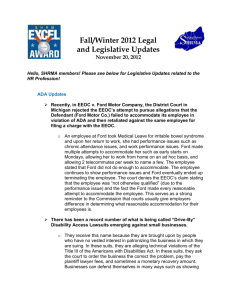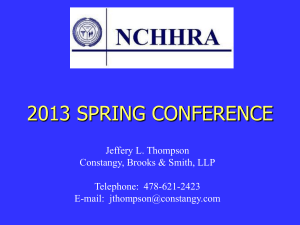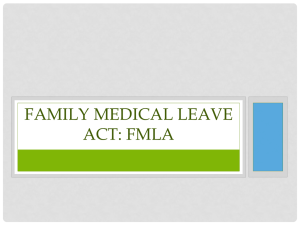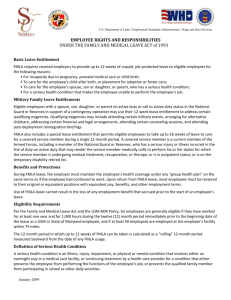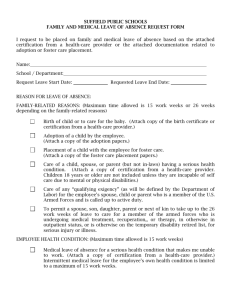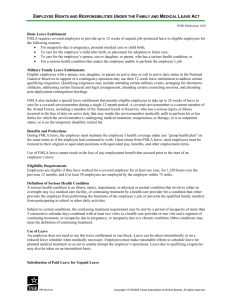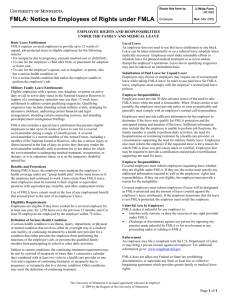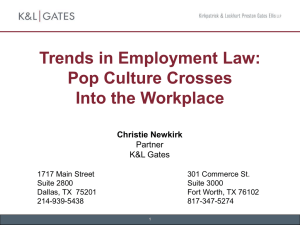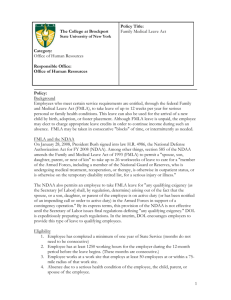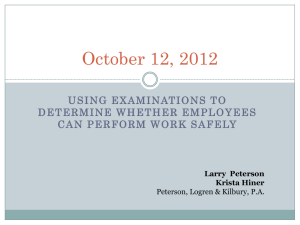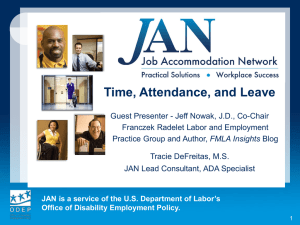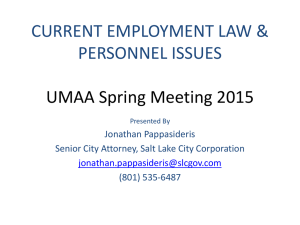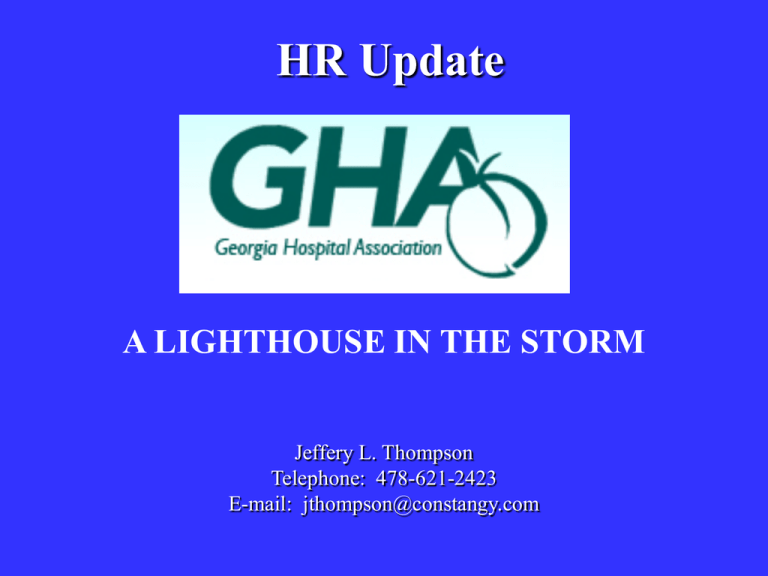
HR Update
A LIGHTHOUSE IN THE STORM
Jeffery L. Thompson
Telephone: 478-621-2423
E-mail: jthompson@constangy.com
Topics That Will Be Discussed
Federal Legislative Activity
Federal Agency Activity
Employment Laws Every HR Professional
Should Know and New Cases From the
Courts in Those Areas
Social Media As The New Frontier
FMLA Abuse
Aggressive Agency Enforcement
EEOC Charge Statistics
EEOC Strategic Enforcement Plan
ADA Targeting (end of leave, essential
functions, reasonable accommodations
with new technologies, the
conversation)
Pregnancy Accommodations (not ADA
generally but evaluated differences
between how other conditions treated)
DOL Enforcement
DOL Enforcement
OFCCP Enforcement
Discussion Question #1
Sarah is your employee. Sarah, who has always
been a “problem” employee, comes to your
office and claims she has been sexually
harassed. You tell Sarah you are going to
investigate, but you ask her not to speak to
anyone about the investigation. Sarah leaves
your office and goes to talk to Elizabeth, her
coworker, about the harassment and
investigation. What action should you take?
The EEOC’s Position
Where an employer has "broad policy
that imposes discipline" for
discussing investigations of
discrimination or harassment, it will
likely violate the retaliation
provision of Title VII.
Where an employer makes
confidentiality a "suggestion" it is less
likely to be a violation. However, this
suggestion must truly be a suggestion.
The Courts
At least one Court has gone the other
way.
The Central District of California found
that where a employee violated the
company's confidentiality policy on
internal investigations, and the court
found it to be a legitimate reason for
termination.
Day v. Sears Holdings Corp., 930 F. Supp.
2d 1146 (March 13, 2013 C.D. Cal.)
News from the Courts
Harassment
Vance v. Ball State University (U.S. Sup. Ct)
Issue: was harasser a supervisor?
Ct: to be supervisor, must be empowered to
take tangible employment actions against
harassment victim
Important: will limit liability of employers in
harassment litigation
Discussion Question #2
Bob is one of your employees. Bob has
religious beliefs that do not allow him to
work on a Saturdays. Your hospital
requires its employees to work on any day
they are needed to respond to customer
demands. What should you do?
Religious Accommodation
Brown v. Hot Springs Nat’l Park Hospital
24/7 availability was essential job function
for hospital manager position
Plaintiff’s religious beliefs precluded
weekend work
Ct: no duty to eliminate essential function,
and accommodation would be undue
hardship
Religious Accommodation
Antoine v. First Students, Inc.
Employer policy permitted swapping shifts
to accommodate religious beliefs
Ct: policy not sufficient; implies that
greater employer effort to accommodate is
required
Discussion Question #3
Lacy began working in the cafeteria 30
days ago. She has just approached you
and explained that she is 5 months
pregnant and is not going to be able to lift
over 10 pounds during her pregnancy and
will need time off for bed rest. What
should you do?
Pregnancy Discrimination Act And
ADAAA
Pregnancy Discrimination Act (PDA)
Must treat pregnancy like any other
illness.
Not generally covered by the ADA but
evaluated differences between how other
conditions are treated.
Pregnancy-related conditions may need to
be accommodated.
Is Pregnancy A Disability?
Wonasue v. Univ. of Mayland Alumni Assn.
Employee with severe morning sickness
requested accommodations; employer
denied.
Court found that morning sickness is not a
disability; no duty to accommodate.
Some pregnancy related conditions could
be a disability.
Latest Concerning The Americans
With Disability Act Amendment Act
Reasonable Versus
Unreasonable
Reasonable Versus
Unreasonable
Job Restructuring
Employee who hurts back at work
Light duty – limited lifting
Worker’s Compensation
Shared Lifting
Reasonable or Unreasonable?
Schedule Modifications
Medical condition requires morning therapy
Clinic opens at 8
Sue works from 8-4
As an accommodation, Sue wants to report to
work at 10:00 a.m.
Reasonable or Unreasonable?
Change in Supervisor
Accounts Receivable employee
Investigated for misconduct
Post traumatic stress and anxiety
Wants to be moved to another supervisor
Reasonable or Unreasonable?
Working From
Home/Telecommuting
Employee with irritable bowel syndrome
Works in Accounts Payable
Wants to work from home 4 days a week
Reasonable or Unreasonable?
Working from Home
EEOC v. Ford Motor Company
Employee’s job required face to face interaction
with clients and co-workers
Ford denied request to work from home;
suggested other accommodations
Employee was terminated for performance
Ct: Employee’s request to telecommute was not
a reasonable accommodation
Discussion Question #4
Jimmy is an employee at your hospital. He
can no longer perform his job because he
cannot lift the requisite number of pounds.
However, there is an open, vacant position
in another department which does not
require any heavy lifting. Do you have to
offer Joe the job?
United Airlines v. EEOC
U.S. Supreme Ct. declined to review 7th
Circuit ruling
7th Circuit held: ADA requires employer to
assign disabled employee to vacant
position for which qualified
Not sufficient to permit employee to
compete for job
Discussion Question #5
Paul has been with your hospital for over
two years and has been a “marginal”
employee. He has recently been out on
FMLA leave and his twelve weeks is about
to end. He asks for additional time of 90
days of unpaid personal leave. The doctor
says he may need even more leave time
than the additional 90 days. What should
you do?
EEOC’s Position On Leave Of
Absence
If employee is considered disabled, must
attempt accommodation (unless undue
hardship).
Accommodation may mean extending
leave beyond what is normally allowed.
Be sure to review current policy for
random termination periods (i.e., one 90
day leave then terminate.
Leave of Absence
Brangman v. AstraZeneca
Company granted leave and two
extensions; rejected third extension.
Court found that 3rd request unreasonable
because employee could not show she
would eventually return to work.
Employee Retirement Income
Security Act (ERISA)
Defense of Marriage Act (DOMA)
U.S. v. Windsor (U.S. Sup. Ct.)
Struck down section 3 of DOMA
Result: same sex marriages recognized for
federal law purposes; recognized in some
states but not others
Fair Labor Standards Act (FLSA)
Changing Clothes Not
Compensable Work
Sandifer v. U.S. Steel Corp. (1/27/14)
“Donning and doffing" safety gear before
and after work shift constitutes changing
clothes
Employers and unions can agree to
exclude the time workers spend putting on
and taking off protective clothing from
compensable work time
Family and Medical Leave Act
(FMLA)
Enforcement of Employer
Attendance Policies
Srouder v. Dana Light Axle Mfg, LLC
FMLA regs require employee to comply
with notice and procedures for absences
Employee failed to call in per company
policy; terminated
Ct: no FMLA violation
Enforcement of Employer
Attendance Policies
Paris v. Sanderson Farms, Inc.
Company sent letter: leave expired; will terminate
if you do not return to work or submit request for
additional leave and medical certification;
No response; terminated her; employee filed suit
Ct: not FMLA violation to require compliance with
company policies on requesting leave
12 Tips For Avoiding FMLA Abuse
1.
Calculate FMLA leave using A “rolling” 12 month
period. (Except for leave to care for service member)
2.
Require employees use all paid leave prior to taking
unpaid FMLA.
3.
Require medical certifications to be returned within
15 days.
4.
Require employees to provide thirty (30) days notice
for foreseeable FMLA leave. Gives you the luxury to
plan around the absences, which increases
productivity and minimizes abuse.
12 Tips For Avoiding FMLA Abuse
5.
Demand that employees schedule medical treatments
around operations.
6.
Establish and enforce reasonable attendance and callin rules for all leave.
7.
Assign employees taking foreseeable intermittent
leave to alternative positions that cause less
disruption, if possible.
8.
Require “fitness for duty” certifications for employees
returning to work.
12 Tips For Avoiding FMLA Abuse
9.
Require employees to submit A recertification every
thirty (30) days.
10. Require second and third opinions.
11. Have a policy prohibiting employees from working
second jobs while on leave (of any type).
12. Use private investigators to prove FMLA fraud.
The New NLRB- How It Will Affect
Healthcare?
Service Employees
International Union (SEIU)
More than half of SEIU's over 2 million
members work in health care.
SEIU represents:
110,000 nurses
40,000 doctors
over 500,000 home health aides
160,000 nursing home workers
Recent SEIU Petition Filings
(Hospitals)
1/21/2014- Health Care Services Group (WI)
1/17/2014-Luther Manor (WI)
1/14/2014- Dental Dreams, PLLC (MI)
1/13/2014- St. Francis Hospital (CA)
1/10/2014- Health Care Services Group (FL)
1/7/2014- Golden Living Center (MA)
12/30/2013- Lifestar Response of New Jersey
Harris v. Quinn
On January 21, 2014, the SCOTUS heard oral
argument on a case that will have a big
impact on organized labor in the healthcare
industry
The case was brought by the National Right
to Work Legal Defense Foundation.
The case involves eight home care providers
in Illinois and addresses the precedent of
Abood v. Detroit Board of Education, which
stands for the principle that the non-union
workers must pay their “fair share” of union
dues in the public sector.
Harris v. Quinn
These home-care providers, who do not
want to belong to a union or to pay
dues and do not want a union to speak for
them, have asked the Court to overrule the
Abood decision.
The SEIU is actually one of the parties in
this matter and is currently receiving about
$3.6 million in dues from these personal
care workers.
NLRB News
The NLRB’s “poster” regulation is effectively
dead.
This “poster” regulation would have
required employers to post notices to
employees of their rights under the NLRA
which hindered employers’ rights to talk
about unionization in their workplace.
NLRB Attempting To Change Rules
14-21 Day Elections
Union Access
Names/Phone Numbers/Addresses or
Email Accounts
Third Party Access during OSHA
investigations
The NLRB Strikes Again!
In April of 2013, an administrative law
judge for the NLRB issued an opinion
invalidating two of a healthcare provider’s
policies regarding the use of email,
company computers and company
Internet.
This ruling is another in a long line of
NLRB decisions and “guidance” intent on
broadening employee communication
rights under the guise of Section 7.
The NLRB Strikes Again!
A Pennsylvania union filed a charge against
holding company UPMC (affiliated with the
University of Pittsburgh Schools of the Health
Sciences), and numerous subsidiary hospitals,
alleging that UPMC’s policies regarding
solicitation, electronic mail and messaging, and
use of information technology resources violated
the NLRA and “chilled” activity that is protected
under Section 7 of the NLRA.
The policies were considered “broad” and
vague.”
The NLRB Strikes Again!
The judge found that stating non-work-related email
use was allowed unless the usage “may be
disruptive,” is “offensive,” or is “harmful to morale”
was too vague.
The language that permitted management to
exercise any discretion to allow or forbid certain
communications was struck.
The most troubling part of this decision was that the
judge invalidated a provision requiring company
approval before Internet transmission of “sensitive,
confidential and highly confidential information.”
The judge thought this would inhibit employees
from discussing the terms and conditions of their
employment.
Health Care Union’s Latest
Strategies
Internet/Social Media Campaign
Lobbying Patient Care Issues
Going Public With Patient Safety
and Fairness Issues
Target Certain Hospitals that are
Vulnerable
Blogs and Social Media: Class
Warfare and Political Activism
Final Thoughts
It Starts At Home
- Lilly Tomlin

